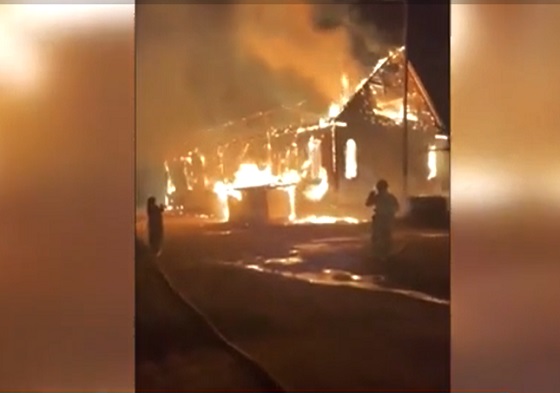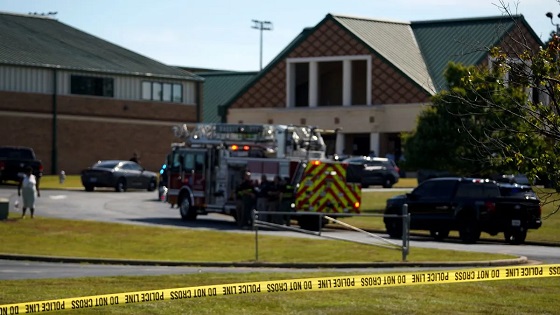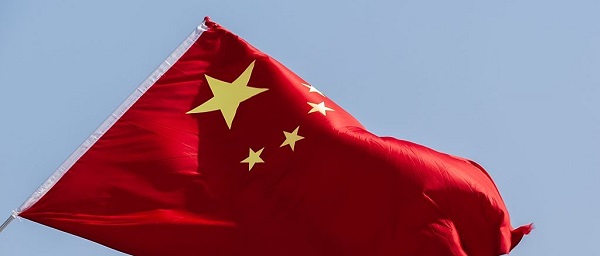Uncategorized
Foreign Secretary: Brexit may have to be delayed

LONDON — A key member of Prime Minister Theresa May’s government acknowledged Thursday that Britain’s exit from the European Union may have to be delayed if negotiations on a divorce deal drag on.
Foreign Secretary Jeremy Hunt told the BBC that while it is difficult to know whether negotiations will stretch to the final hours, a delay may be necessary to pass legislation to implement Brexit. His comments gained attention because of fears the country is simply not ready to leave — even though May’s Downing Street office insisted nothing had changed.
“I think it is true that if we ended up approving a deal in the days before 29 March then we might need some extra time to pass critical legislation, but if we are able to make progress sooner then that might not be necessary,” Hunt said.
The comments come as the influential
“It is not just the government that needs to be ready – business and citizens need to know how the changes will affect them and what they need to do,” it said in a report.
Britain’s carmakers issued a stark assessment Thursday about Brexit’s impact on the industry, warning that two-thirds of the country’s global trade is at risk if the U.K. leaves the European Union without an agreement on the future.
Investment in the industry fell 46
“With fewer than 60 days before we leave the EU and the risk of crashing out without a deal looking increasingly real, UK Automotive is on red alert,” Hawes said. “Brexit uncertainty has already done enormous damage to output, investment and jobs.”
Hawes said the figures showing a drop in investment, stark though they are, pale in comparison to what is ahead should the U.K. leave the EU on March 29 without a deal, severing frictionless trade links overnight with the EU and other global markets. Britain’s Parliament has refused to rule out a no-deal Brexit, voting this week instead to give Prime Minister Theresa May more time to try to iron out a compromise with the EU.
“Brexit is the clear and present danger and, with thousands of jobs on the line, we urge all parties to do whatever it takes to save us from ‘no deal’,” Hawes said.
If no deal is in place, existing trade agreements with the EU will evaporate overnight. Without such agreements, economic chaos is likely to follow, with fears about trade in food, medicine and other essential supplies.
In another sign of the ticking clock, House of Commons leader Andrea Leadsom said a scheduled February recess for lawmakers may be scrapped.
May must report back to the House of Commons by Feb. 13, either with a reworked version of the deal or with a statement on what she plans to do next. She intends to return to Brussels in hopes of reopening negotiations on the most controversial aspect of the withdrawal deal, which covers the border between the U.K.’s Northern Ireland and EU member Ireland.
This section of the deal, known as the backstop, would keep the U.K. in a customs union with the EU in order to remove the need for checks along the border. Supporters of a sharp exit with the EU fear it will trap Britain in regulatory lockstep with the trading bloc, and want the backstop replaced with unspecified “alternative arrangements.”
EU leaders have so far been unwilling to reconsider the withdrawal agreement. In a telephone call on Wednesday evening, Irish Prime Minister Leo Varadkar told May that it was necessary to have a backstop that was “legally robust and workable in practice.”
The border is crucial to the divorce deal because it will be the only land frontier between the U.K. and the EU after Brexit. Border checkpoints have disappeared since Ireland and Britain both became members of the EU single market in the 1990s, and since the 1998 Good Friday peace accord, which largely ended decades of violence in Northern Ireland.
European Council President Donald Tusk also spoke with May and later tweeted: “The EU position is clear and consistent. The Withdrawal Agreement is not open for renegotiation.”
Danica Kirka, The Associated Press
Uncategorized
CNN’s Shock Climate Polling Data Reinforces Trump’s Energy Agenda


From the Daily Caller News Foundation
As the Trump administration and Republican-controlled Congress move aggressively to roll back the climate alarm-driven energy policies of the Biden presidency, proponents of climate change theory have ramped up their scare tactics in hopes of shifting public opinion in their favor.
But CNN’s energetic polling analyst, the irrepressible Harry Enten, says those tactics aren’t working. Indeed, Enten points out the climate alarm messaging which has permeated every nook and cranny of American society for at least 25 years now has failed to move the public opinion needle even a smidgen since 2000.
Appearing on the cable channel’s “CNN News Central” program with host John Berman Thursday, Enten cited polling data showing that just 40% of U.S. citizens are “afraid” of climate change. That is the same percentage who gave a similar answer in 2000.
Dear Readers:
As a nonprofit, we are dependent on the generosity of our readers.
Please consider making a small donation of any amount here.
Thank you!
Enten’s own report is an example of this fealty. Saying the findings “kind of boggles the mind,” Enten emphasized the fact that, despite all the media hysteria that takes place in the wake of any weather disaster or wildfire, an even lower percentage of Americans are concerned such events might impact them personally.
“In 2006, it was 38%,” Enten says of the percentage who are even “sometimes worried” about being hit by a natural disaster, and adds, “Look at where we are now in 2025. It’s 32%, 38% to 32%. The number’s actually gone down.”
In terms of all adults who worry that a major disaster might hit their own hometown, Enten notes that just 17% admit to such a concern. Even among Democrats, whose party has been the major proponent of climate alarm theory in the U.S., the percentage is a paltry 27%.
While Enten and Berman both appear to be shocked by these findings, they really aren’t surprising. Enten himself notes that climate concerns have never been a driving issue in electoral politics in his conclusion, when Berman points out, “People might think it’s an issue, but clearly not a driving issue when people go to the polls.”
“That’s exactly right,” Enten says, adding, “They may worry about in the abstract, but when it comes to their own lives, they don’t worry.”
This reality of public opinion is a major reason why President Donald Trump and his key cabinet officials have felt free to mount their aggressive push to end any remaining notion that a government-subsidized ‘energy transition’ from oil, gas, and coal to renewables and electric vehicles is happening in the U.S. It is also a big reason why congressional Republicans included language in the One Big Beautiful Bill Act to phase out subsidies for those alternative energy technologies.
It is key to understand that the administration’s reprioritization of energy and climate policies goes well beyond just rolling back the Biden policies. EPA Administrator Lee Zeldin is working on plans to revoke the 2010 endangerment finding related to greenhouse gases which served as the foundation for most of the Obama climate agenda as well.
If that plan can survive the inevitable court challenges, then Trump’s ambitions will only accelerate. Last year’s elimination of the Chevron Deference by the Supreme Court increases the chances of that happening. Ultimately, by the end of 2028, it will be almost as if the Obama and Biden presidencies never happened.
The reality here is that, with such a low percentage of voters expressing concerns about any of this, Trump and congressional Republicans will pay little or no political price for moving in this direction. Thus, unless the polls change radically, the policy direction will remain the same.
David Blackmon is an energy writer and consultant based in Texas. He spent 40 years in the oil and gas business, where he specialized in public policy and communications.
Uncategorized
Kananaskis G7 meeting the right setting for U.S. and Canada to reassert energy ties


Energy security, resilience and affordability have long been protected by a continentally integrated energy sector.
The G7 summit in Kananaskis, Alberta, offers a key platform to reassert how North American energy cooperation has made the U.S. and Canada stronger, according to a joint statement from The Heritage Foundation, the foremost American conservative think tank, and MEI, a pan-Canadian research and educational policy organization.
“Energy cooperation between Canada, Mexico and the United States is vital for the Western World’s energy security,” says Diana Furchtgott-Roth, director of the Center for Energy, Climate and Environment and the Herbert and Joyce Morgan Fellow at the Heritage Foundation, and one of America’s most prominent energy experts. “Both President Trump and Prime Minister Carney share energy as a key priority for their respective administrations.
She added, “The G7 should embrace energy abundance by cooperating and committing to a rapid expansion of energy infrastructure. Members should commit to streamlined permitting, including a one-stop shop permitting and environmental review process, to unleash the capital investment necessary to make energy abundance a reality.”
North America’s energy industry is continentally integrated, benefitting from a blend of U.S. light crude oil and Mexican and Canadian heavy crude oil that keeps the continent’s refineries running smoothly.
Each day, Canada exports 2.8 million barrels of oil to the United States.
These get refined into gasoline, diesel and other higher value-added products that furnish the U.S. market with reliable and affordable energy, as well as exported to other countries, including some 780,000 barrels per day of finished products that get exported to Canada and 1.08 million barrels per day to Mexico.
A similar situation occurs with natural gas, where Canada ships 8.7 billion cubic feet of natural gas per day to the United States through a continental network of pipelines.
This gets consumed by U.S. households, as well as transformed into liquefied natural gas products, of which the United States exports 11.5 billion cubic feet per day, mostly from ports in Louisiana, Texas and Maryland.
“The abundance and complementarity of Canada and the United States’ energy resources have made both nations more prosperous and more secure in their supply,” says Daniel Dufort, president and CEO of the MEI. “Both countries stand to reduce dependence on Chinese and Russian energy by expanding their pipeline networks – the United States to the East and Canada to the West – to supply their European and Asian allies in an increasingly turbulent world.”
Under this scenario, Europe would buy more high-value light oil from the U.S., whose domestic needs would be back-stopped by lower-priced heavy oil imports from Canada, whereas Asia would consume more LNG from Canada, diminishing China and Russia’s economic and strategic leverage over it.
* * *
The MEI is an independent public policy think tank with offices in Montreal, Ottawa, and Calgary. Through its publications, media appearances, and advisory services to policymakers, the MEI stimulates public policy debate and reforms based on sound economics and entrepreneurship.
As the nation’s largest, most broadly supported conservative research and educational institution, The Heritage Foundation has been leading the American conservative movement since our founding in 1973. The Heritage Foundation reaches more than 10 million members, advocates, and concerned Americans every day with information on critical issues facing America.
-

 Censorship Industrial Complex2 days ago
Censorship Industrial Complex2 days agoCanada’s privacy commissioner says he was not consulted on bill to ban dissidents from internet
-

 Alberta2 days ago
Alberta2 days agoEnbridge CEO says ‘there’s a good reason’ for Alberta to champion new oil pipeline
-

 Business2 days ago
Business2 days agoFormer Trump Advisor Says US Must Stop UN ‘Net Zero’ Climate Tax On American Ships
-

 National1 day ago
National1 day agoDemocracy Watch Renews Push for Independent Prosecutor in SNC-Lavalin Case
-

 Business1 day ago
Business1 day agoOver two thirds of Canadians say Ottawa should reduce size of federal bureaucracy
-

 Indigenous19 hours ago
Indigenous19 hours agoConstitutional lawyer calls for ‘false’ claims to end in Canadian residential schools burials
-

 Alberta10 hours ago
Alberta10 hours agoPremier Smith addresses the most important issue facing Alberta teachers: Classroom Complexity
-

 Alberta10 hours ago
Alberta10 hours agoAlberta taxpayers should know how much their municipal governments spend






